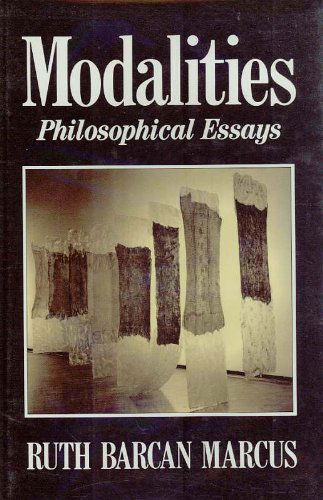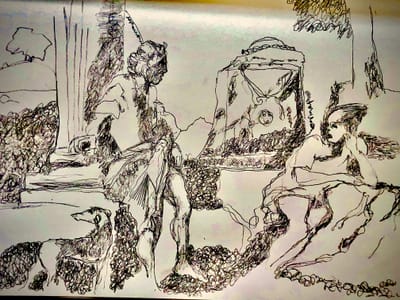Philosophy of Education Notes
Why Ruth Marcus Barcan's Modal Logic Is Really Really Good for Arts, Humanities and Sports Education
Ruth Barcan Marcus is not usually discussed in philosophy of education. Her name is more familiar in logic and metaphysics, where she is known for early work on quantified modal logic, identity, essentialism and moral dilemmas. Yet if we step back from the technical details and look at the picture of rationality that emerges from her essays, we find a conception that cuts across many of the assumptions that now shape educational theory and policy. Where much current thinking, often implicitly, treats rationality as either a mathematical ideal in the style of Quine or as a language centred practice in the style of Davidson, Brandom or certain continental and Wittgensteinian approaches, Marcus offers a more naturalistic, object centred and conflict tolerant account. It is a view of rationality as the management of modal, moral and doxastic commitments by embodied agents in an actual world, not the maintenance of a tidy web of propositions or the mastery of a single discourse.
Read MoreA contemporary philosophy of education must begin by specifying what kind of questions it is entitled to answer and what counts as a good answer in those domains where education operates. It must state how knowledge is made available to learners in schools and colleges, by what norms teachers justify their claims, how different kinds of subject matter shape those norms, and what limits prevent education from pretending to be an all purpose tribunal over culture or science. If we start from the neo Kantian framework reconstructed by Beiser in his The Genesis of Neo-Kantianism, 1796-1880, rather than from a Hegelian one, we gain a disciplined way of carrying out that programme.
Read MoreAccording to Frederick Beiser's brilliant The Genesis of Neo-Kantianism 1796 -1880 neo Kantian philosophy of aesthetic education begins from a boundary. It holds firmly to the separation of theoretical and practical reason and refuses to collapse aesthetic judgement into moral judgement. On this view the arts are practices with their own aims and standards. Ethics has its own domain with its own kind of necessity. The two can and often do interact within a life and within institutions, but they do not reduce to one another.
Read MoreBowie’s simple but far reaching reversal regarding philosophy of art is that philosophy does not merely interpret art. Art often shows philosophy what it has forgotten about meaning. In Aesthetic Dimensions of Modern Philosophy he tracks this claim through a long line of sources. He begins before Kant with Montaigne, Descartes and Hume to show how modern ideas of the self emerge, and why they quickly run into the problem of how experience becomes intelligible at all. He then argues that the problem cannot be solved by piling up propositions, because much of what makes sense in lived practices is not propositional in the first place. This is where aesthetics enters as a basic mode of disclosure rather than as decoration.
Read MoreConsequentialism says that right action is action that brings about the best overall consequences, given the aims we care about. On Sellars’ way of working, we do not start by postulating a mysterious property of "goodness". We begin with the public practices that already guide decision and justification. We then make explicit the roles that consequentialist terms play within those practices. Finally, we ask what we are committed to when we use those terms correctly.
Read MoreGellner’s mature articulation of his model of Nationalism sharpens the distinction between two universal features of human life while insisting that their historical interplay gives rise to the non-universal phenomenon of nationalism. “Society,” he writes, “is made up of culture and organisation.” Culture, in this view, is not genetically inscribed behaviour but a set of “patterns of conduct generated by emulation.” While certain cognitive or linguistic capacities may be rooted in biological preconditions, like Chomsky’s idea that language acquisition presumes a universal grammar, the actual transmission and content of culture are unconstrained by biology. Culture, in this model, can change rapidly and even deliberately.
Read MoreI want to say that this is something that I think in my usual half baked and confused way. And it's probably to do with the fact that I still see things through the lens of the Philosopher Ernest Gellner and I think in a way he foresaw this. His anthropology of reason revealed that rationality was never truly universal. It was a style of cognition produced by a specific social formation: industrial society, with its need for impersonality, precision, and continuous innovation. Rationalism, he argued, emerged from a particular cultural ecology: it was not the antidote to culture, but a culture in its own right.
Read MoreI've been going to the Institute of Education's philosophy of education seminars on Wednesday nights for nearly two decades. Two key figures in the department over that time have been Paul Standish and Jan Derry. Each offer nuanced and profound philosophical insights into education and it struck me that I ought to write a note to myself trying to get a grip on their different approaches and why despite disagreeing with their commitments in some respects (I'm neither a Heideggerian nor a Hegelian) engement with their ideas has been so fruitful and rewarding for me .
Read More






